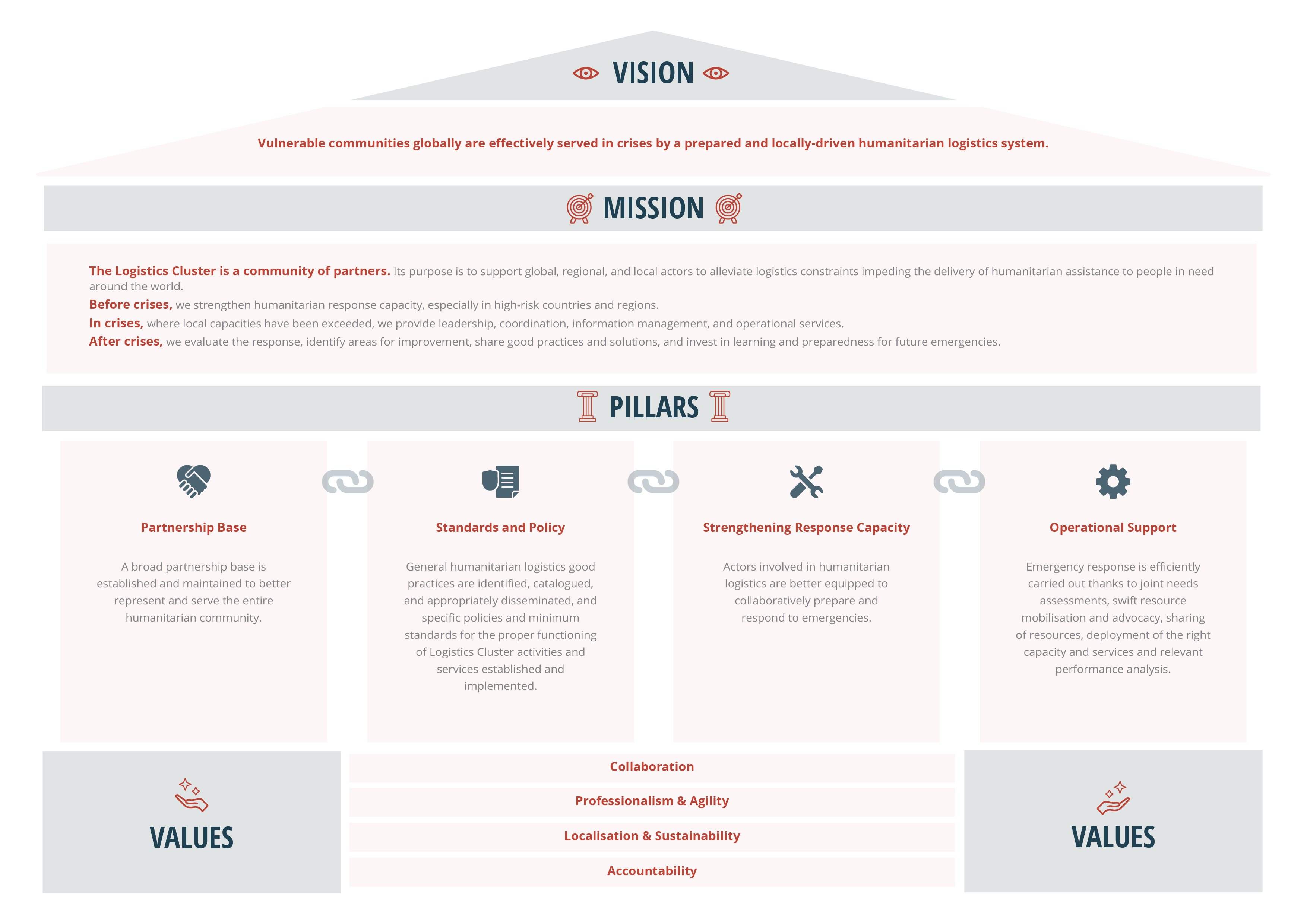The Logistics Cluster is one of 11 humanitarian Clusters established by the Inter-Agency Standing Committee (IASC) following the Humanitarian Reform and the ulterior Transformative Agenda. The “Cluster Approach” aims to strengthen system-wide preparedness and technical capacity to respond to humanitarian emergencies by ensuring coordination, predictable leadership, and accountability across the main technical sectors of humanitarian response (e.g. logistics, health, shelter).
The Logistics Cluster Structure
The Logistics Cluster is a community of partners collaborating to overcome logistics constraints and improve the overall humanitarian logistics response. The Logistics Cluster governance is steered by its partner organisations at both global and country-level, supported by dedicated support teams, and led by the appointed Cluster Lead Agency (CLA).
The World Food Programme (WFP) was designated by the IASC as the Logistics Cluster lead agency at the global level and is accountable to the Emergency Relief Coordinator for its performance. As such, WFP hosts the Global Logistics Cluster Support Team in its headquarters in Rome, Italy and facilitates its activities through the allocation of necessary resources at global and local level – these resources are contingent on funding provided by donors to the Logistics Cluster operations. WFP also acts as provider of last resort for common logistics services.
Composed by representatives of the CLA and partner organisations appointed at global level during the Global Logistics Meetings (GLM) for a two-year mandate, the Strategic Advisory Group (SAG) is the Logistics Cluster steering body whose members represent and report to the entire community of partners. The SAG notably provides strategic support and guidance to the Global Logistics Cluster Support Team and may establish ad hoc working groups to develop specific aspects related to partnerships. A local SAG may also be appointed by partners at country-level when deemed relevant.
Lastly, the Logistics Cluster activities are supported by dedicated humanitarians active at both global and country level:
Global Logistics Cluster Support Team
The permanently active support structure that drives, together with partners, the Logistics Cluster strategy implementation globally and is accountable for its results. It fosters, develops, and maintains partnerships to strengthen the community of partners the Logistics Cluster is based upon and oversees the organisation of global events. Furthermore, the Global Logistics Cluster Support Team also provides guidance, support, and surge capacity to Logistics Cluster activities in-country, reinforcing the capacity of staff on the ground.
Country Logistics Cluster Support Team
At a country level, the Logistics Cluster is a temporary coordination mechanism activated by the IASC and accountable to the Humanitarian Coordinator through the CLA. The Logistics Cluster Support Team coordinates the Logistics Cluster activities in-country, notably by convening humanitarian actors operating locally and facilitating the logistics coordination and information management. Support provided varies in nature and scale depending on each operation’s needs. The Country Logistics Cluster Support Team is hosted and resourced by the appointed country CLA and may benefit from partners secondment. Where needed, the Logistics Cluster support team also facilitates access to common logistics services provided by its partners and manages the prioritisation of requests to this service through jointly established criteria.
The Logistics Cluster Activities
The Logistics Cluster is a community of partners. Its purpose is to support global, regional, and local actors to alleviate logistics constraints impeding the delivery of humanitarian assistance to people in need around the world. Before crises, it strengthens humanitarian response capacity, especially in high-risk countries and regions. In crises, where local capacities have been exceeded, it provides leadership, coordination, information management, and operational services. After crises, it evaluates the response, identifies areas for improvement, shares good practices and solutions, and invests in learning and preparedness for future emergencies.
The Logistics Cluster work is divided into four overarching interconnected pillars:
- Partnership Base
- Standards and Policy
- Strengthening Response Capacity
- Operational Support
They all comprise a broad set of activities – led both by partners and the support teams – that may be found in the Global Logistics Cluster Strategy Implementation Plan.
These activities rest upon core values the Logistics Cluster abide by at any given moment:
Collaboration
The Logistics Cluster is a partnership mechanism with the ambition to consolidate its existing network, further expand it to include new actors, and make it more representative at global, regional, and local level. Its partners are committed to jointly work towards collective outcomes and use the Logistics Cluster as a platform to collaboratively address common issues and steer its strategic orientation.
Professionalism & Agility
The Logistics Cluster serves the humanitarian community as a whole. It is guided by locally identified priorities and focuses on addressing evidence-based needs through operational and preparedness activities. The Logistics Cluster strives to enhance the humanitarian logistics efficiency by learning from the past, leveraging technology and innovations, and supporting operational agility in a perpetually changing humanitarian environment.
Localisation & Sustainability
The Logistics Cluster is committed to foster and support a localised response capacity. When operating in-country, it provides tailored solutions geared towards minimising disruption of local markets and promoting local resilience. Furthermore, the Logistics Cluster encourages a sustainable approach to humanitarian response and generally endeavours to apply lasting solutions, both for the communities and the environment.
Accountability
The Logistics Cluster is accountable to affected populations through its partners, in compliance with the humanitarian principles. It is further accountable to the humanitarian and national leaderships through the lead agency as defined by the IASC guidelines. All Logistics Cluster plans, strategic decisions, and prioritisations are made transparently by and for its partners.
The Logistics Cluster Strategy
The 2022 – 2026 Logistics Cluster strategy sets out the collective commitment of its community of partners around a joint mission and vision, to be achieved through common objectives, and supported by shared values. It shall be used to guide and prioritise the Logistics Cluster activities and initiatives at the global and country level, as well as to plan and secure resources for them to be undertaken. Through this document, the Logistics Cluster community re-affirmed its partnership-oriented identity and its willingness to position collaboration at its core.


